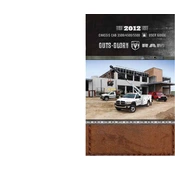Ram Chassis Cab 3500 2012 User Manual


The recommended maintenance schedule for the 2012 Ram Chassis Cab 3500 includes regular oil changes every 3,000 to 5,000 miles, tire rotations every 6,000 miles, and a comprehensive inspection every 12,000 miles. Refer to the owner's manual for detailed intervals and services.
To reset the oil change indicator, turn the ignition to the 'On' position without starting the engine. Press the accelerator pedal three times within 10 seconds. Turn the ignition off, then start the engine to confirm the reset.
The 2012 Ram Chassis Cab 3500 is recommended to use 5W-30 synthetic oil for optimal performance and engine protection. Always check your owner's manual for specific oil specifications.
To troubleshoot electrical issues, start by checking the battery connections for corrosion. Ensure fuses and relays are intact. A multimeter can be used to test for power continuity. Consult a professional if the problem persists.
If experiencing transmission problems, check the transmission fluid level and condition. Low or dirty fluid can cause issues. If the problem continues, have a professional diagnostic test performed to identify any mechanical or electronic faults.
To improve fuel efficiency, maintain proper tire pressure, perform regular maintenance, use cruise control when possible, and avoid excessive idling. Removing unnecessary weight can also enhance fuel efficiency.
The 2012 Ram Chassis Cab 3500 has a towing capacity that ranges from approximately 12,000 to 22,750 pounds, depending on the engine type and configuration. Consult the owner's manual or a dealership for precise figures based on your model.
To replace the air filter, locate the air filter housing in the engine bay. Unclip or unscrew the cover, remove the old filter, and insert a new air filter. Ensure it is seated properly before securing the housing cover.
Common causes of overheating include low coolant levels, a malfunctioning thermostat, a failing water pump, or a clogged radiator. Regular maintenance can help prevent overheating issues.
To check for recalls, visit the official Ram website or the National Highway Traffic Safety Administration (NHTSA) website. Enter your vehicle's VIN to see a list of any recalls or service campaigns.